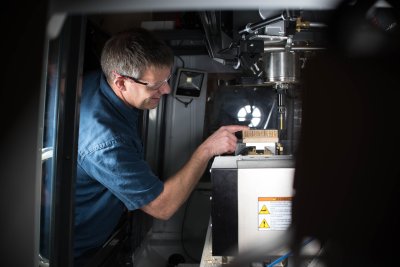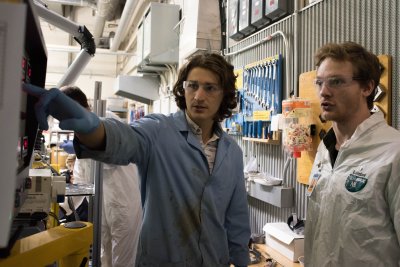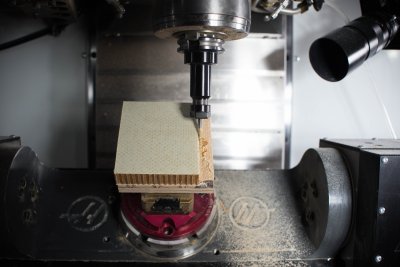WWU Engineering Faculty Awarded Pair of Aerospace Research Grants
Faculty members in Western Washington University’s Engineering and Design Department have been awarded a pair of grants totaling over $160,000 by Washington’s Joint Center for Aerospace Innovation.
Both projects address current challenges in aerospace manufacturing, and Western’s faculty will work closely with industry partner Zodiac Aerospace to put their research into direct use. The research is focused on the common use of honeycombed carbon-fiber bulkheads, walls, and overhead compartments; while this material is incredibly strong and lightweight, it presents many challenges during the manufacturing phase that end users like passengers never see.
WWU Assistant Professor of Engineering and Design John Misasi, who is working with Research Analyst Cecile Grubb on one of the grants, described the components in question and how his research will be used.
“It’s called ‘honeycomb’ because it is made of these small carbon-fiber cells of this incredibly strong material that really does look like a honeycomb. The honeycomb sits between top and bottom layers of fiberglass to produce an incredibly durable, lightweight sandwich that can be molded, shaped and formed into things like overhead bins or lavatory bulkheads,” he said. ”But one of the issues around these molded structures is the resin used to both bind them together, like a glue, as well as make them flame retardant.”
John is trying to glue them together and we’re trying to tear them apart.
Misasi said the resin now used to perform these vital functions is extremely toxic when it is being applied (but safe once dry), which of course makes it a hazardous substance to use during the manufacturing process.
“The main focus of my grant is to formulate a new resin compound that does everything the old resin does – such as being strong and self-extinguishing in case of fire – but that isn’t toxic,” he said. “And the new compound has to be scalable – in other words, it has to be easily manufactured in large batches, or it won’t be feasible in a large manufacturing setting.”
Associate Professor Derek Yip-Hoi and Assistant Professor David Gill’s grant takes these carbon-fiber honeycombs and puts them under the cutter, literally.
“John is trying to glue them together and we’re trying to tear them apart,” said Gill.
More specifically, Gill and Yip-Hoi are working to try and cut down on what is called “flagging and fraying” in the industry, terms that refer to small patches of still-attached leftover fabric after the honeycomb panels have been cut to size.
“Think about how smooth and efficient the assembly process has become,” said Gill. “Then think about how it all grinds to a halt because each of these panels needs to have flags of Nomex fiber laboriously cut off each piece with a pair of scissors. That’s what we’re trying to fix.”
Gill said their work is focusing on the mechanics involved with cutting the panels, and how using different cutting bits at different angles and different speeds changes the amount of flagging.
“Part of our process involves watching a cut that might take 5 seconds and slowing it down using an ultra-highspeed camera to watch every rotation of the cutting bit to see how it all interacts and then doing our measurements to see what bits at what angles are working best,” Gill said.
If these types of slowdowns to the manufacturing process can be solved, Gill said honeycomb panels could be used far more prevalently.
“For example, electric cars could see a huge boost to their ranges if they were made from honeycomb fiber panels instead of traditional materials, because they would be so much lighter,” he said. “But the bottlenecks associated with the materials, whether it’s the resins or the flagging, need to be solved first. But this research goes far beyond being able to make an overhead bin faster.”
The results of their year-long research will be handed over to their colleagues at Zodiac Aerospace this summer. For more information about either of these projects, contact David Gill at david.gill@wwu.edu or John Misasi at john.misasi@wwu.edu.


